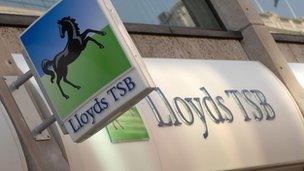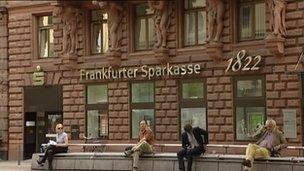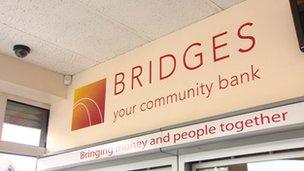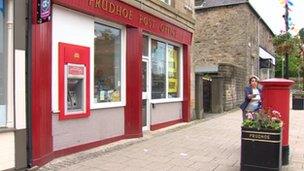Could going local be the key to getting banks lending?
- Published
- comments

Some businesses say high street banks have not provided the support they needed during the recession
Ask many businesses what their biggest problem is and they'll often point to the lack of finance from their bank.
Despite the efforts made by the previous and current governments, our high street banks still seem reluctant to lend money and provide credit for small and medium-sized businesses.
Gradually, more competition is arriving on the high street with Metro Bank and Virgin Money now touting for business.
But many companies say banks are still too remote from them, and pine for the days when they had a real relationship with a local manager.
So some are now beginning to look abroad for inspiration.
Economic turbulence
Unlike Britain, Germany has retained its local banks. Almost every town, city and district has one, owned and run by the communities.
And the people that run those banks believe they've played a crucial role in helping Germany weather the economic turbulence of the last few years better than the UK.
They say local banks have continued to support small businesses because of their roots in the community and their accountability to local people.
Many more have survived and are now in a better position to grow again.
In addition, the banks' local roots meant they weren't as exposed to the problems in international markets.
Wolfgang Neumann, is the German Savings Banks, external' representative in Brussels.
He said: "The big banks stopped providing loans especially to small and medium sized enterprises whereas the co-operative and local savings banks carried on providing access to finance and kept those companies running.
"Local banking is important because it means money from local savers doesn't just end up funding casino-style banking somewhere else in the world."
Community banks
No wonder then that some in Britain are considering what this country could do to copy that model.

Some think it is time the UK copied the German system where most towns and cities have their own local banks
Hexham Conservative MP Guy Opperman, external is one enthusiast.
He said: "In most countries the lending is done by big superbanks, which are impersonal, and dominated - in the UK - by a 'London knows best attitude'.
"Seventy per cent of all German business lending is done by way of the local community banks.
"German business lending is done by local people to local people. It is a model that we would be well advised to take note of because we can replicate it here."
There is a problem though. Some of Germany's local banks are co-operatives, but many are owned and run by local authorities.
It doesn't seem likely that councils coping with cuts will be capable of starting banks any time soon.
But there are some alternatives.
Credit unions are already rooted in their communities, largely providing loans and savings schemes for individuals.
The government though has now given them more freedom to compete with banks.

Credit unions like Bridges in Tyneside have more freedom but are some way off competing with big banks
They are now able to pay interest on savings, and rules which restricted them to small local areas have been lifted.
But they are still some way from competing with the high street banks. Their customer base is made up largely of people in deprived areas who banks won't touch.
Unlike their counterparts in the US, they are not yet attracting the more affluent customers they need to build up capital.
Many then are struggling just to survive and are not ready to expand. They are also often run by volunteers who may not relish the idea of taking on Barclays and HSBC.
Trusted name
So instead some are suggesting we look to our past for a possible alternative.
Until 1993, the Post Office ran the state-owned Girobank, external, but when it was sold off, its role in providing banking services became much more limited.

Some think post offices could offer a local banking service in communities
But with 12,000 branches and a trusted local name, could they become the home for new local banks?
Jim Thomson, the postmaster in Prudhoe in Northumberland, certainly thinks so. He remembers when his branch was busy with people using it as a bank.
He also argues that bringing banking back would also prevent future post office closures.
He said: "Post offices are trusted - we have more than 100 years of trust, whereas people do not trust the big banks anymore.
"We know the local people and the local businesses. We are not someone sitting in London saying we can't do this or that."
And Labour did start to form plans to put banks back into post offices before losing power.
The coalition though has so far failed to pursue those plans.
Personal interaction
But there's no doubt that some in business do want to see change.
Hugh Morgan-Williams is the chair of Canford Audio in Washington on Wearside. He believes regional and local banks could get the economy going again.
He said: "With the existing banks, for small businesses it's often a tick-box system and too often the computer says no, and there isn't that vital personal interaction between a business owner and their bank manager.
"A new institution would have an opportunity to build that. If it was set up properly with a board made up of directors who live in the community, you would get more accountability."
Guy Opperman believes businesses will get their wish. He says the new Financial Services Bill, external will make it easier for new banks to be set up.
He said: "The Bill will, I suggest and sincerely hope, make it easier to establish local banks, which can only be a good thing.
"The momentum is growing: a local community bank run by local people for the investments of local people will happen in the North East."
There's hope then but for now companies will still have to somehow persuade the likes of Lloyds and Nat West to be more generous.